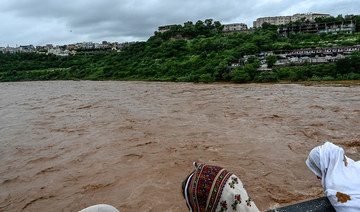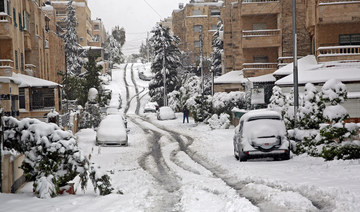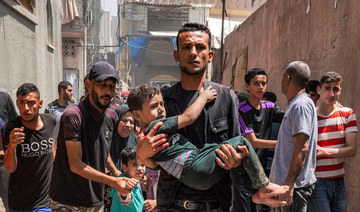LONDON: Britain’s weather service on Tuesday issued an amber “Extreme Heat” warning for parts of England and Wales, with no respite in sight from hot dry conditions that have sparked fires, broken temperature records and strained the nation’s infrastructure.
The amber warning — the second-most severe after red — will be in place from Thursday through to the end of Sunday and means that people vulnerable to extreme heat could face adverse health effects, the UK Met Office said.
Temperatures are expected to peak at 35 Celsius (95 Fahrenheit) on Friday and may hit 36C in some places on Saturday.
The warning follows the driest July for England since 1935, when temperatures rose above 40C for the first time, turning a renewed spotlight to the impacts of climate change.
Other European nations have also faced a scorching heatwave in recent weeks with temperatures often exceeding 40C.
Britain, which is less used to such high temperatures, has struggled to cope.
July’s heatwave caused power outages, damaged airport runways, buckled rail tracks and ignited dozens of blazes in London, where the fire brigade faced its busiest week since World War Two.
Several water companies have since imposed usage restrictions and supermarkets have limited sales of disposable BBQs that firefighters warn can set light to tinder-dry grass. Ambulance services have received hundreds of calls from patients facing breathing difficulties, dizziness and fainting.
The amber warning, which follows Britain’s first-ever red “Extreme Heat” warning in July, covers much of the southern half of England and parts of eastern Wales.
Scientists have said the July heatwave was made at least 10 times more likely because of climate change.
UK issues new ‘extreme heat’ warning for England and Wales
https://arab.news/87pgp
UK issues new ‘extreme heat’ warning for England and Wales

- Temperatures are expected to peak at 35 Celsius (95 Fahrenheit) on Friday and may hit 36C in some places on Saturday
Russia says United States is being hypocritical over ICC and Israel

The ICC — which can charge individuals with war crimes, crimes against humanity and genocide — is investigating Hamas’ Oct. 7 cross-border attack and Israel’s devastating military assault on Hamas-ruled Gaza, now in its seventh month.
White House spokesperson Karine Jean-Pierre said on Monday the United States did not support the ICC’s investigation of Israel and did not believe that the court had jurisdiction.
US President Joe Biden said last year that the ICC decision to issue an arrest warrant for Putin was justified. The United States has shared details of alleged Russian war crimes in Ukraine with the ICC.
Russia says the warrant against Putin is a meaningless attempt by the West to soil Russia’s reputation and denies war crimes in Ukraine. Ukraine says Russia committed war crimes. Russia says the West has ignored Ukraine’s crimes, a charge denied by Kyiv.
“Washington fully supported, if not stimulated, the issuance of ICC warrants against the Russian leadership,” Russian Foreign Ministry spokesperson Maria Zakharova said in a post on Telegram.
But “the American political system does not recognize the legitimacy of this structure in relation to itself and its satellites,” Zakharova said, adding that such a position was intellectually “absurd.”
The Kremlin has called the issuing of the warrant against Putin outrageous and legally void, as Russia is not a signatory to the treaty that created the ICC.
Israel is not a member of the ICC, while the Palestinian territories were admitted as a member state in 2015.
Prime Minister Benjamin Netanyahu said on Friday that any ICC decisions would not affect Israel’s actions but would set a dangerous precedent.
Israeli officials are worried that the court could issue arrest warrants against Netanyahu and other top officials for alleged violations of international humanitarian law in Gaza, Israeli media have reported.
They said the ICC is also considering arrest warrants for leaders from Hamas.
London police arrest sword-wielding man after reports of stabbing

- Police said the suspect had attacked members of the public and two officers
LONDON: British police have arrested a man armed with a sword following reports of people having been stabbed during a serious incident in northeast London although it was not thought to be terrorism-related, the capital’s police force said on Tuesday.
The 36-year old man was arrested after police were called to reports of a vehicle being driven into a house in the area close to Hainault train station, the Metropolitan Police said in a statement.
Police said the suspect had attacked members of the public and two officers.
“This must have been a terrifying incident for those concerned. I know the wider community will be feeling shock and alarm,” Metropolitan Police Deputy Assistant Commissioner Ade Adelekan said. “We do not believe there is any ongoing threat to the wider community.”
The force said the incident did not appear to be terror-related and they were not looking for further suspects.
“I am being regularly updated about the incident at Hainault Station this morning,” Britain’s interior minister James Cleverly said on X. “My thoughts are with those who have been affected.”
Gunman kills six in attack on Afghan mosque – Taliban spokesman
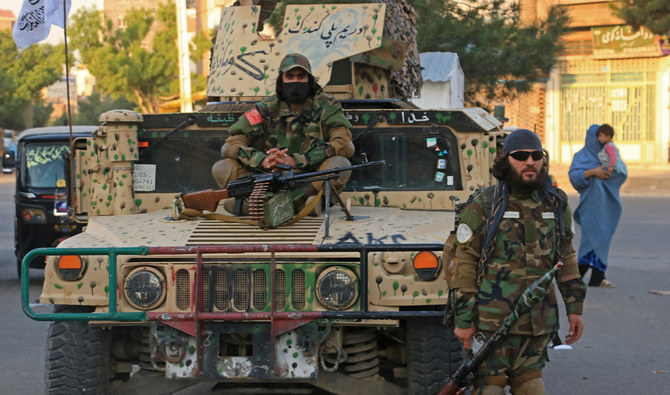
- Locals say the mosque served the minority Shiite community just south of the Afghan city of Herat
- While no group has claimed the attack, the regional chapter of Daesh is viewed as threat in Afghanistan
HERAT: A gunman stormed a mosque in western Afghanistan and killed six people, a government spokesman said Tuesday, with local residents claiming the minority Shiite community had been targeted.
Interior ministry spokesman Abdul Mateen Qani said that “an unknown armed person shot at civilian worshippers in a mosque” in Herat province’s Guzara district on Monday at around 9:00 p.m. (1630 GMT).
“Six civilians were martyred and one civilian was injured,” he wrote on social media platform X early Tuesday morning.
Locals said the mosque served the minority Shiite community in a district just south of the provincial capital of Herat city, and the imam and a three-year-old child were among those killed.
They also said a team of three gunmen staged the attack, contradicting the official account.
“One of them was outside and two of them came inside the mosque, shooting the worshippers,” said 60-year-old Ibrahim Akhlaqi, the brother of the slain imam. “It was in the middle of the prayers.”
“Whoever was in the mosque has either been martyred or wounded,” added 23-year-old Sayed Murtaza Hussaini.
While no group has claimed the attack, the regional chapter of Daesh is the largest security threat in Afghanistan and has frequently targeted Shiite communities.
The Taliban government has pledged to protect religious and ethnic minorities since returning to power in August 2021, but rights monitors say they’ve done little to make good on that promise.
The most notorious attack linked to Daesh since the Taliban takeover was in 2022, when at least 53 people — including 46 girls and young women — were slain in the suicide bombing of an education center.
Taliban officials blamed Daesh for the attack, which happened in a Shiite neighborhood of the capital Kabul.
Afghanistan’s new rulers claim to have ousted Daesh from the country and are highly sensitive to suggestions the group has found safe haven there since the withdrawal of foreign forces.
Taliban authorities have frequently given death tolls lower than other sources after bombings and gun attacks, or otherwise downplayed them, in an apparent attempt to minimize security threats.
A United Nations Security Council report released in January said there had been a decrease in Daesh attacks in Afghanistan because of “counter-terrorism efforts by the Taliban.”
But the report said Daesh still had “substantial” recruitment in the country and that the militant group had “the ability to project a threat into the region and beyond.”
Daesh chapter spanning Afghanistan, Pakistan and Central Asia claimed responsibility for the March attack on the Crocus City Hall concert venue in Moscow, killing more than 140 people.
It was the deadliest attack in Russia in two decades.
China says Palestinian rivals Hamas and Fatah met for talks in Beijing
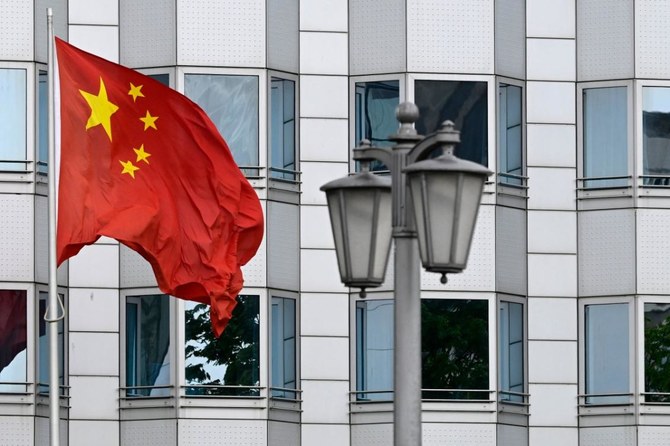
BEIJING: China said Tuesday that rival Palestinian groups Hamas and Fatah met in Beijing recently for “in-depth and candid talks on promoting intra-Palestinian reconciliation.”
“Representatives of the Palestine National Liberation Movement and the Islamic Resistance Movement recently came to Beijing,” foreign ministry spokesman Lin Jian said, referring to the groups by their formal names.
“The two sides fully expressed their political will to achieve reconciliation through dialogue and consultation, discussed many specific issues and made positive progress,” he added, without specifying when the sides had met.
Islamist movement Hamas seized control of the Gaza Strip in 2007 after ferocious fighting with its rivals in Fatah, which maintains partial administrative control in the Israeli-occupied West Bank through the Palestinian Authority.
China has historically been sympathetic to the Palestinian cause and supportive of a two-state solution to the Israeli-Palestinian conflict.
Beijing has been calling for an immediate ceasefire since the start of the current Israel-Hamas war in October last year, when attacks by the militant group resulted in the deaths of about 1,170 people in Israel, mostly civilians, according to an AFP tally based on Israeli official figures.
Israel’s retaliatory offensive has killed at least 34,535 people in the Gaza Strip, mostly women and children, the health ministry in the Hamas-run territory said on Tuesday.
Beijing said on Tuesday the two factions had “agreed to continue this process of dialogue with a view to achieving Palestinian unity at an early date.”
“The two sides highly appreciated China’s firm support for the just cause of the Palestinian people to restore their legitimate national rights,” Lin said.
He did not identify the representatives from Hamas and Fatah who met in Beijing.
Chinese President Xi Jinping has called for an “international peace conference” to resolve the fighting.
In November, Beijing hosted a delegation of diplomats from Arab and Muslim-majority nations, in which Foreign Minister Wang Yi warned a “humanitarian disaster” was unfolding in Gaza.
The heatwave baking parts of Asia
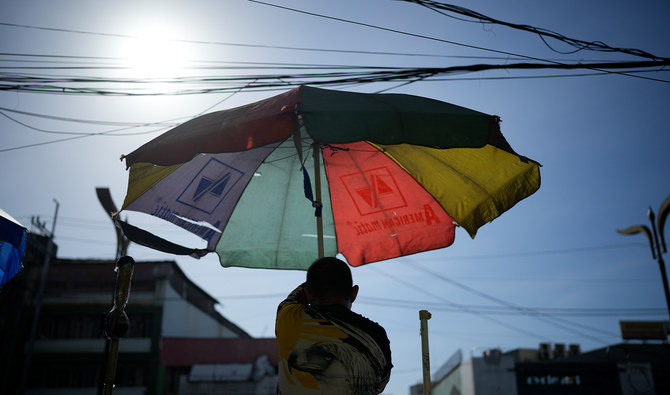
- Record temperatures from Myanmar to Philippines force millions of children to stay home from school
- Experts say climate change causing more frequent heatwaves that are more intense, last longer
BANGKOK: Large swaths of Asia are sweltering through a heatwave that has topped temperature records from Myanmar to the Philippines and forced millions of children to stay home from school.
Here are some questions and answers about the extreme heat, which scientists warn will become more frequent and intense because of human-induced climate change.
The heat has hit much of South and Southeast Asia, with record temperatures in Myanmar’s Chauk and the Philippine capital Manila in recent days.
Thai authorities have issued warnings about “severe conditions,” while authorities in Cambodia, Myanmar, Vietnam, India and Bangladesh all forecast temperatures above 40 degrees Celsius (104 degrees Fahrenheit).
The Philippines and Bangladesh both suspended in-person classes, while India is reviewing whether heat has affected turnout in national elections.
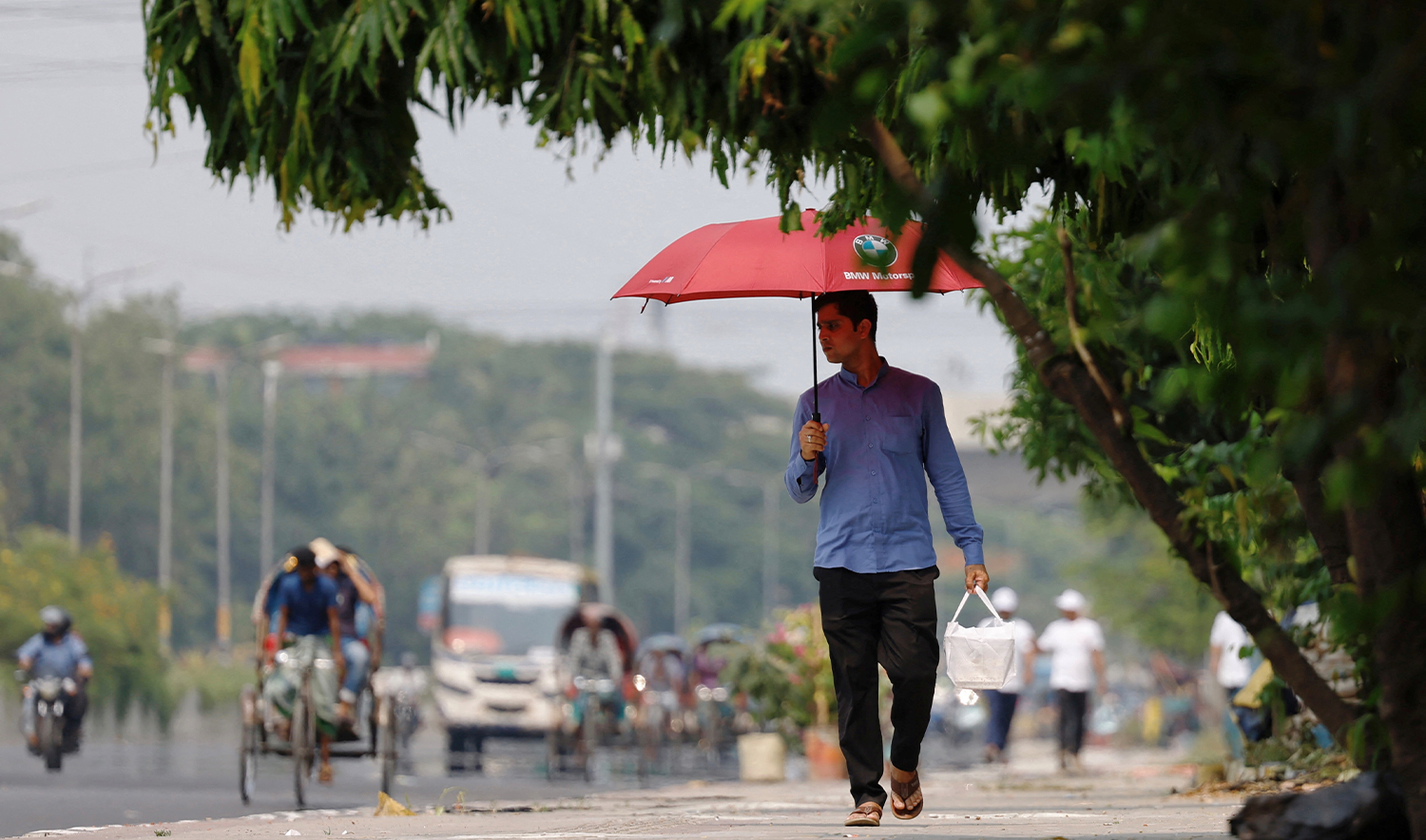
Even northern Japan has been affected: temperatures in Japan’s Sapporo this month passed 25C (77F) at the earliest point of any year on record.
The months preceding the region’s monsoon, or rainy season, are usually hot but temperatures this year are well above average in many countries.
Experts say climate change is causing more frequent heatwaves that are more intense and last longer.

Asia is also warming faster than the global average, according to the World Meteorological Organization, a UN agency.
And the El Nino weather phenomenon is playing a role this year, said Milton Speer, a meteorologist and visiting research fellow at the University of Technology Sydney.
“The lack of cloud in El Ninos means that temperatures are likely to be higher on average,” he told AFP.
Sea surface temperatures in the region are currently several degrees Celsius above normal, “which helps keep the temperatures higher than average inland overnight.”
“So daytime temperatures start climbing from a higher base.”
There are other factors at play too, including deforestation that reduces shade and increases dry surface area, and the urban heat island effect, where concrete, glass and steel structures absorb rather than reflect heat.
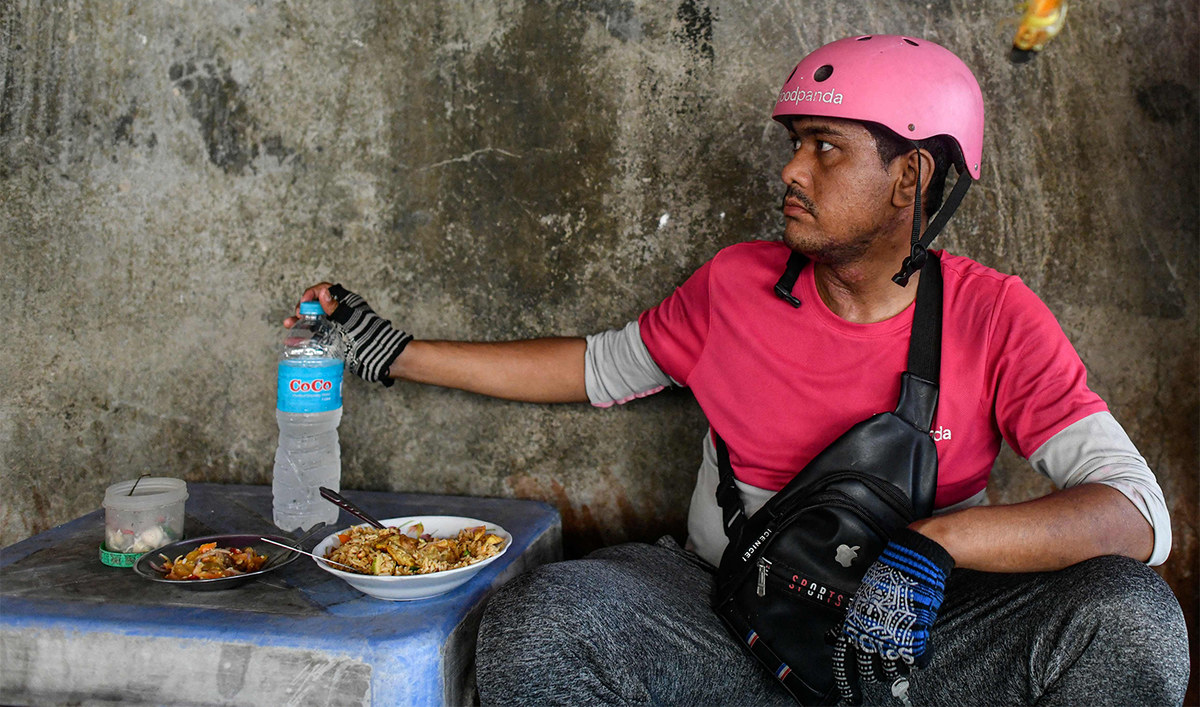
Extreme heat disproportionately affects children, the elderly and those living in poverty.
Children, older people and those with pre-existing conditions or disabilities can overheat more quickly.
Those living in poverty also often lack cooling solutions at home or are forced to work in conditions without adequate heat protection.
The UN children’s agency UNICEF warned this month that 243 million children across the Pacific and East Asia are at risk from heatwaves.
“Child exposure to heatwaves leads to heat stress,” said Salwa Aleryani, health specialist for UNICEF’s regional East Asia and Pacific office.
“Severe issues can develop, such as cardiovascular diseases, organ failure, muscle and nerve dysfunction,” she told AFP.
Authorities in several countries asked citizens to stay at home. Hospitals in Nepal were put on standby, while Cambodian officials asked public schools to keep doors and windows open for ventilation.
Measures went further in Bangladesh and the Philippines, with schools closed for days.
But many children will not have cooler conditions at home, warned Aleryani.
They may also be left unsupervised by parents who cannot afford to stay home from work, and risk serious interruptions to their education.
The heat in Bangladesh is not expected to recede until Thursday at the earliest, and in Thailand forecasters warned that annual rains may arrive in late May, several weeks later than normal.
Speer said the overall warming trend will continue even when the region’s monsoon arrives to lower temperatures.
“Heatwaves will continue to happen more often because the oceans and atmosphere are gradually heating up due to global warming,” he said.
That in turn poses growing risks to crops and livestock, as well as humans whose jobs require them to work outdoors.
Adaptation will be crucial, including offering “sustainable neighborhood structures with air conditioning where people could go during the day and sleep at night,” Speer said.




